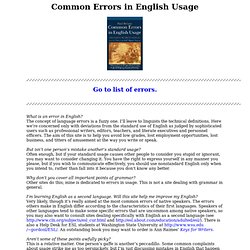

All Tenses - English Lesson. Grammar Exercises - Simple Past Tense. Homeschool Language Arts (English) Activities and Games Free Downloads. Modal Verbs and their substitutes. Auxiliary Verbs. Question Tags. English Prepositions. Exercises on Prepositions Prepositions are short words (on, in, to) that usually stand in front of nouns (sometimes also in front of gerund verbs).

Even advanced learners of English find prepositions difficult, as a 1:1 translation is usually not possible. One preposition in your native language might have several translations depending on the situation. There are hardly any rules as to when to use which preposition. The only way to learn prepositions is looking them up in a dictionary, reading a lot in English (literature) and learning useful phrases off by heart (study tips). The following table contains rules for some of the most frequently used prepositions in English: Prepositions – Time Prepositions – Place (Position and Direction) Pronouns. English grammar: A complete guide. Do you have a question about the correct usage of the semi-colon or how to place relative adverbs in a sentence?

If so, you've come to the right place! The edufind.com English grammar guide is a complete reference on the rules of English usage. Every grammatical rule is explained in clear, simple language with several examples and, when necessary, counter-examples. The grammatical rules covered by this guide are categorized by part of speech. You will find the categories listed below. Comparisons Conditional Future Gerund and Present Participle Infinitive Passive Voice Past Present. Modal Verbs and their substitutes. Which is correct?
Grammar Handbook « Writers Workshop: Writer Resources « The Center for Writing Studies, Illinois. Thank you for using the Grammar Handbook at the Writers' Workshop, University of Illinois at Urbana-Champaign.

This Handbook explains and illustrates the basic grammatical rules concerning parts of speech, phrases, clauses, sentences and sentence elements, and common problems of usage. While we have done our best to be comprehensive and accurate, we do not claim to be the final authority on grammatical issues. We appreciate constructive emails with questions, suggestions, or corrections, but please understand we may be unable to respond to all of them. Handbook Sections Parts of Speech Nouns Verbs Adjectives and Adverbs Conjunctions. Grammar.
Phrasal Verbs. Phrasal verbs are mainly used in spoken English and informal texts.

(The more formal a conversation or text, the less phrasal verbs are found.) Phrasal verbs consist of a verb plus a particle (preposition, adverb). The particle can change the meaning of the verb completely, e.g.: look up – consult a reference book (look a word up in a dictionary) look for – seek (look for her ring) look forward – anticipate with pleasure (look forward to meeting someone) There are no rules that might explain how phrasal verbs are formed correctly - all you can do is look them up in a good dictionary and study their meanings. Frequently Used Phrasal Verbs with: Grammar Bytes! Grammar Instruction with Attitude. Grammar Instruction with Attitude Home • Terms • Exercises • MOOC • Handouts • Presentations • Videos • Rules • About • Shop • Feedback ©1997 - 2020 by Robin L. SimmonsAll Rights Reserved. valid html. Common Errors in English Usage. Go to list of errors.

What is an error in English? The concept of language errors is a fuzzy one. I’ll leave to linguists the technical definitions. Here we’re concerned only with deviations from the standard use of English as judged by sophisticated users such as professional writers, editors, teachers, and literate executives and personnel officers. The aim of this site is to help you avoid low grades, lost employment opportunities, lost business, and titters of amusement at the way you write or speak. But isn’t one person’s mistake another’s standard usage? Why don’t you cover all important points of grammar? I’m learning English as a second language. Aren’t some of these points awfully picky? What gives you the right to say what an error in English is? I found a word you criticized in the dictionary! Vocabulary, grammar. Vocabulary, grammar.